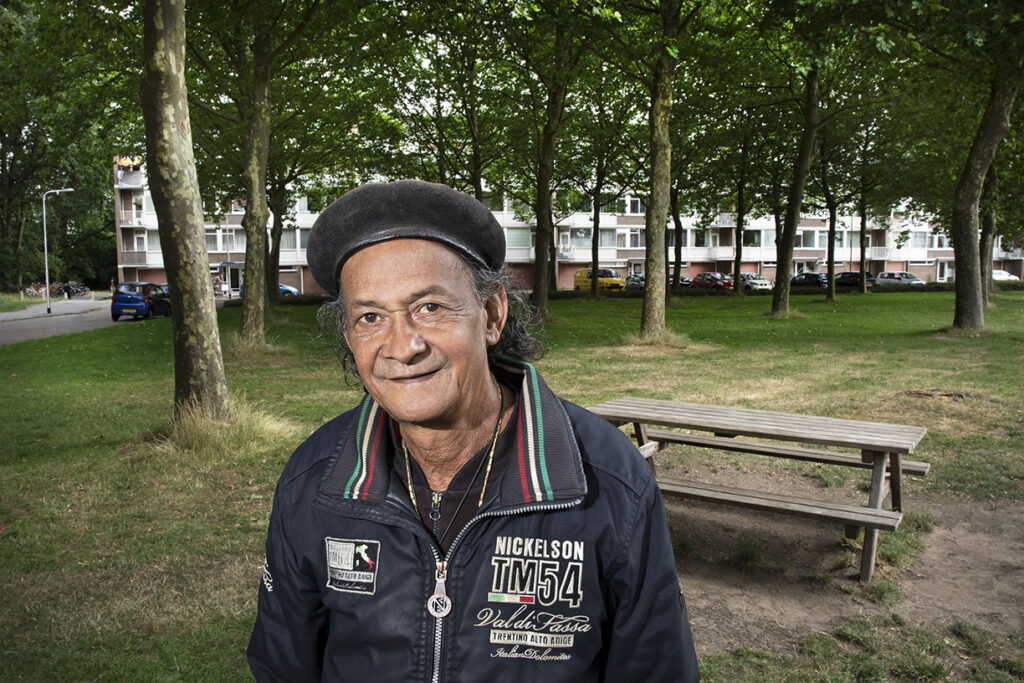Sonny: ‘I’m a street kid, I attended street university’
When Sonny (65) moved from Paramaribo to Tilburg, he imagined himself in paradise. Now he is a celebrity in his own neighborhood. From his favorite picnic table under the sycamore trees next to his apartment, he enjoys chatting with passersby.

You are a household name in this neighborhood.
‘My favorite place is here at this picnic bench. You always see me here. I go upstairs to sleep, shower, and eat and then I come down. Every day, even in winter. Sometimes I go to stay with my aunt in Amsterdam, but then I soon miss my home. Here I am, my spirit, everything I am is here.’
How did you end up in the Hogeschoollaan apartment?
‘When I moved to Tilburg from Suriname in 1989, I got a job at a textile company in Berkel-Enschot. I was living in people’s homes, but I had to leave unexpectedly. I went to Tiwos (housing corporation, ed.) and they helped me get this house in a hurry. This was my first home of my own in Tilburg, and I never moved again.’
So you like it here?
‘I live here very well. On the third floor overlooking the sycamore trees. They weren’t there yet when I moved in; I saw them being planted. Beautiful trees, I think they are almost thirty years old now.
‘I would like to continue living here, but because of an inflammation of my ankle, I find it increasingly difficult to carry groceries upstairs. I would like to move downstairs, but only on the same entrance hall I’m on now.
Who are our neighbors?
Anyone walking from Tilburg University station to the campus will invariably pass three large flats. They are right next to the railroad tracks and all three were built in 1961 by housing corporation Tiwos. The residents are Tilburg University’s immediate neighbors. Univers wondered who these neighbors actually are and how they experience living next to the ever-expanding knowledge institution. These are their stories.
‘They’re probably going to demolish these flats in a few years, but I want to move back here. A new flat with an elevator would be nice. Even if it’s a more expensive apartment, I just want to live next to the university again. Because if I don’t know something I can always ask those people.’
So what do you ask?
‘For example, difficult words from Dutch: ‘Hello madam can you explain to me what this word means?’ Then they explain it to me.
‘Or I ask, ‘What country are you from, what did you come here to do, are you studying?’ Lots of kinds of people come here and sit with me for a while. Have a little chat. I’m known here you know!’
And you easily connect with people.
‘I have good contacts here, with almost everyone. Whoever greets me, I greet back. I can greet politely in many languages, Arabic, Surinamese, French, English, Spanish, Taki-Taki (Surinamese Creole, ed.) you name it. I am a street kid; I attended street university. I know so many people. My God, it’s crazy! Even if I go to China, I’m sure I’ll run into people who know me.
‘Dealing with different people is easy for me. Maybe it’s because of my upbringing. All kinds of people came to my dad’s house, the door was open to everyone. Creole, Hindu, Javanese, we were all together.
‘I myself am a mix of those four: my dad’s dad is a Hindu from India, my dad’s mom is from Ambon, Indonesia. My mom’s dad is an Arab from Algeria, and my mom’s mom is from Paris.’
What was your life like in Suriname?
‘I was born in 1958 in Mungo, which is very high above Paramaribo. I have eight brothers and seven sisters. We had a farm with thousands of chickens and pigs on a large plot of land. Because of the war in 1980, my parents fled to the Netherlands. I myself left home when I was fourteen to work as a carpenter in Paramaribo. I already felt like a big man and already lived with my then wife at sixteen.’
Why did you decide to leave Suriname behind and come to Tilburg?
‘I made that decision when I was just thirty. Things were no longer going well between me and my wife. My father, mother, and other family members were already here in Tilburg. My ex-wife remained in Suriname. I have two grown children there.’
What was it like moving from Suriname to the Netherlands?
‘When I just arrived in the Netherlands? My God, I was in paradise! Wow, the lights were on here, because in Suriname it was dark. I liked it. Back then life in the Netherlands was different you know. Everything was cheap with the guilder; ever since the euro everything is a problem.
‘It was a great time. I’m a free person. No problems with nothing. Everywhere I went as a musician. I played percussion in the reggae band Rosjah Fari (in Dutch). We went all over the Netherlands, from Amsterdam to Bergen op Zoom, from Den Bosch to The Hague and Arnhem. Now I don’t play anymore, but at gigs I am still there. I am the father of the band. Beautiful, music. Never any problems and always cheerfulness.’
Do you miss Suriname?
‘No. I did go back a couple of times. To see my children and grandchildren. That’s nice, but I’ve spent more than half my life here in the Netherlands. My mom and dad are buried here. Here is my home, here is where I do everything.’
Translated by Language Center, Riet Bettonviel






